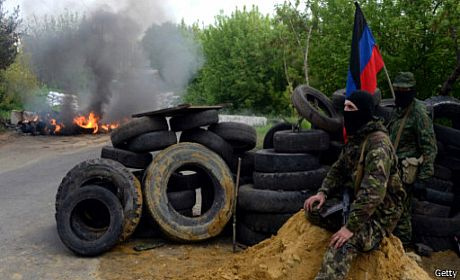NATO Will Not Take Arms

Based on the events that have taken place in eastern Ukraine and the military clashes there, could it be said that another crisis like that of Kosovo is going to happen in the region?
The events that are happening in the areas which once belonged to the former Soviet Union are somewhat similar to each other. This is related to the internal policies of the eastern bloc which today is happening in these regions. This is due to the policies which were formed after WWII from ethnic, regional and international points of view. In Kosovo, we also saw that ethnic movements with foreign support attempted to gain their independence; exactly what is happening in eastern Ukraine now. Despite their different objectives, the movements that are in Ukraine seek to define their political situation based on their objectives and be able to gain autonomy and independence.
The first region which was struck with crisis was Crimea. Russian military forces have even been stationed in this region but no clashes have happened between the Ukrainian army and the opposition groups despite the severe situation in Crimea. What is the regional difference between Crimea and eastern Ukraine where military clashes have happened?
The Crimea peninsula is geographically and ethnically placed in an area where it could easily be separated from the main body of the Ukraine Republic. This region is also separated from the Ukrainian mainland. Historically, Crimea belonged to Ukraine from the beginning and was part of Russia’s territory and was annexed to Ukraine in 1954 in a historic movement. The more important issue is the harmonious nature of the people of that region who mainly have Russian origin. That is why the Russians were able to annex Crimea to their territory. The other point which must be noted is the presence of Russian bases in the Crimea peninsula. These bases are rented by Russia and a considerable volume of Russian forces is present in this region. This issue was transformed into a factor through which Russia could easily and more powerfully advance its policies in Crimea. These are the collective factors which seem to have caused the separation of Crimea to happen without any military clashes.
It is said that the incidents which happened in eastern Ukraine were influenced by Russia but the spokesman of the Russian government has reiterated that his country cannot influence the separatists. Are those people who clashed with the army in eastern Ukraine under the influence of a government? What political objectives do these opposition groups pursue?
The issue of ethnic separation and identity rift has, for years, disappeared among the people who are residents of eastern Ukraine. That is why they have lived alongside each other without any problem during these past years. The events that occurred in Kiev became an excuse for those people who felt dependent on Russia to not allow their political destiny to be in the hands of those who sit in Kiev and pursue different political objectives. These incidents, supported by Russia, caused Crimea to first declare its separation from Ukraine and then spread this idea in the East which ultimately led to the occupation of government centers and the achievement of their goals. Although Russia is considered to be the main supporter of the separatist movements in eastern Ukraine, it must be noted that the people pursue their own political objectives and they cannot be accused of acting in accordance with Russia’s orders. Following the undemocratic incidents that happened in Kiev last February, it can be expected that this trend is pursued within an undemocratic framework and it is on this basis that there are military clashes in this part now.
Following the attack by the Ukrainian army against the East, Russia has asked the Security Council to hold an urgent meeting. Could the Security Council play an active role in such cases considering the accusations which are made against Russia, Europe and the US?
The apparatus of the Security Council does not have the necessary efficiency to resolve such crises. The reason is that the parties of this crisis have veto rights in the Security Council and each one of them could ask this council to get involved in this matter and then be probably faced with the veto of the other party. On this basis, the demands which were made indicate political pressures against the other party. Both sides attempt to ask for the help of the Security Council by pretending that wrongdoings were done against them. This is while each of the parties knows well that the Security Council could not have a definitive and certain answer to this matter. Therefore, the significance of such measures is more about their political gains.
Since the beginning of the crisis in Ukraine, NATO has always attempted to stay out of this issue. Is there the possibility of a NATO military intervention if the security situation is intensified?
It seems impossible that NATO would want this crisis to be promoted from a domestic level to an international issue. This is an issue which none of the big powers is interested in getting involved in under these conditions. It means that both Russia and the West seek to somehow manage this issue, although each one of them is looking to win. Nonetheless, this does not mean that Russia and the West are moving towards serious military confrontation. The entrance of NATO into Ukraine will certainly promote the crisis to an international issue and will force the Russians to get engaged in a military face-off and this could be a big threat for the entire international system.

